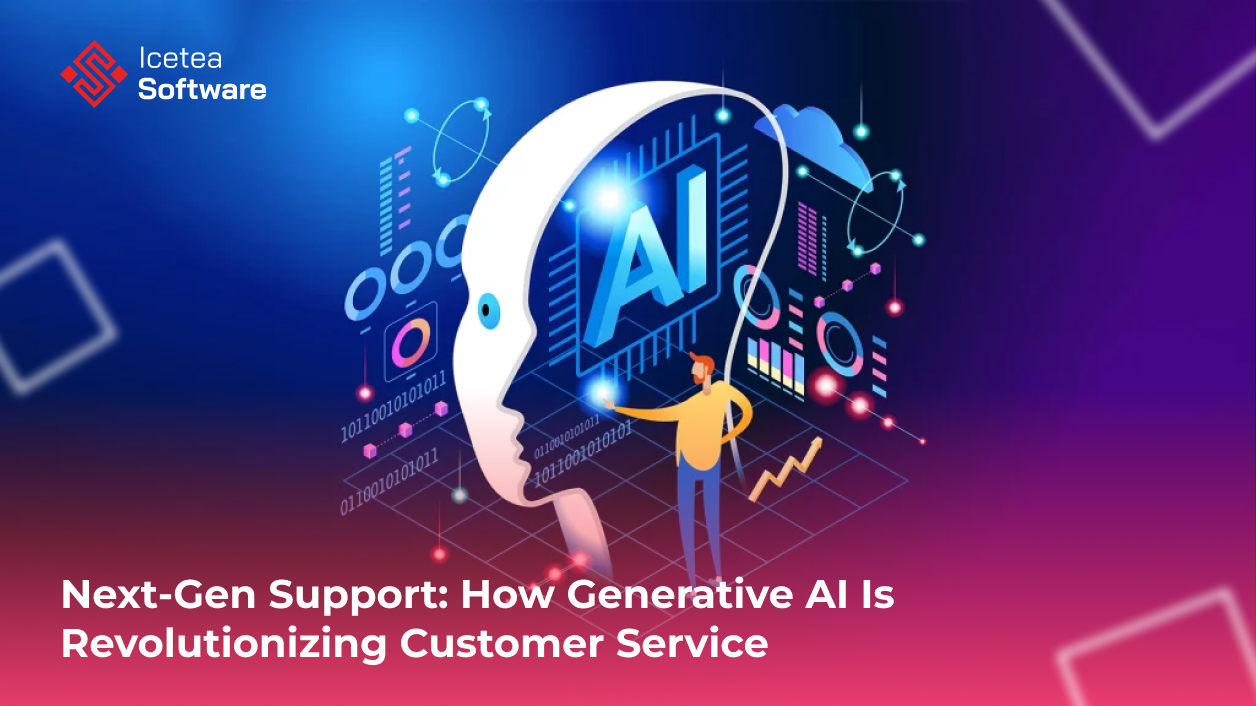Next-Gen Support: How Generative AI Is Revolutionizing Customer Service
- What Is Generative AI and Why It Matters in Customer Service?
- From Reactive to Proactive: The Evolution of Support
- Real-World Applications: How Businesses Are Using Generative AI
- Human + AI: Not Replacement, But Empowerment
- Measurable Impact: What the Numbers Say
- Challenges & Considerations
- The Future: Smarter, More Human Interactions
- Final Thoughts
In the ever-evolving digital landscape, customer service is no longer just a support function — it’s a critical touchpoint that can make or break a brand’s reputation. Today’s customers expect fast, personalized, and seamless interactions, 24/7. Meeting these rising expectations has become one of the most pressing challenges for businesses worldwide.
Enter Generative AI — a transformative technology that is redefining how organizations approach customer service.
What Is Generative AI and Why It Matters in Customer Service?
Generative AI refers to advanced artificial intelligence models capable of generating text, images, audio, or even code. These models, built on powerful large language models (LLMs) like OpenAI’s GPT or Google’s Gemini, are designed to understand complex context, learn from historical interactions, and produce responses that closely resemble natural human communication — all in real time. In the realm of customer service, this translates into faster resolution of inquiries, the ability to manage high volumes of support tickets with consistent quality, and the delivery of hyper-personalized responses tailored to individual customer profiles. The impact is profound: businesses can achieve significantly higher customer satisfaction, reduce operational costs, and empower their support teams to focus on more meaningful, value-driven interactions.
From Reactive to Proactive: The Evolution of Support
Traditionally, customer service was reactive — wait for an issue, respond, and close the ticket. Even with live chat and automation tools, most experiences felt scripted or robotic.
With generative AI, we’re moving toward proactive and conversational support. Imagine a chatbot that not only knows your last purchase but also understands your tone, preferences, and potential frustrations — and responds like a well-trained human agent.
Generative AI tools can:
- Summarize past conversations to give context to support agents,
- Translate queries into multiple languages instantly,
- Detect sentiment and adapt tone,
- Suggest resolutions in real time.
Real-World Applications: How Businesses Are Using Generative AI
1. AI-Powered Virtual Agents
Brands like Sephora, Duolingo, and Vodafone use AI chatbots that can handle up to 80% of queries without human intervention — from order tracking to troubleshooting.
2. Support Ticket Triage & Summarization
Generative AI can analyze incoming tickets, categorize them by urgency and topic, and even draft response templates for agents, saving time and ensuring consistency.
3. Knowledge Base Creation & Maintenance
Instead of manually writing and updating FAQs, companies now use AI to generate help articles from product documentation or past tickets, keeping content fresh and accurate.
4. Voice Assistance & Omnichannel Integration
AI can now power not just chat but voice calls and social media replies, maintaining a unified tone across all touchpoints.
Human + AI: Not Replacement, But Empowerment
A common concern surrounding the rise of AI in customer service is the fear that it will eventually replace human agents. However, the reality is far more nuanced. Generative AI is not here to eliminate the human workforce — it’s here to augment it. Rather than taking over entire support roles, generative AI handles the repetitive, low-value tasks such as answering routine queries, triaging tickets, or summarizing previous interactions. This frees up human agents to focus on complex or emotionally sensitive issues that require empathy, judgment, and critical thinking — areas where humans still excel. AI acts as an intelligent assistant, offering real-time suggestions, surfacing relevant customer history, and even providing sentiment cues to guide more effective conversations. This shift enables support teams to:
- Spend more time solving high-impact, strategic issues rather than getting bogged down in repetitive tasks,
- Reduce agent burnout by eliminating the most tedious aspects of the job,
- And ultimately deliver more empathetic, personalized experiences that foster stronger customer relationships.
In this way, AI becomes a partner, not a replacement — enhancing both the quality of service delivered and the satisfaction of those delivering it.
Measurable Impact: What the Numbers Say
Businesses that have adopted generative AI for customer service report:
- Up to 40% reduction in response times,
- 25–30% increase in customer satisfaction scores (CSAT),
- 50%+ decrease in support costs per interaction,
- Higher agent productivity and retention rates.
For instance, a global e-commerce brand using GPT-powered chatbots achieved a 3x faster resolution rate while maintaining over 90% customer satisfaction in high-traffic periods like Black Friday.
Challenges & Considerations
While the benefits are compelling, businesses must also address:
- Data privacy and compliance: Sensitive customer information must be securely managed.
- Bias and hallucination risks: Generative models can generate incorrect or biased responses if not properly tuned.
- Integration with legacy systems: Smoothly embedding AI into existing support stacks requires thoughtful implementation.
Successful deployment depends on strong governance, human oversight, and continuous training of the models.
The Future: Smarter, More Human Interactions
Generative AI is not the endgame — in fact, it marks the beginning of a smarter, more intuitive era in customer service. While today’s systems already demonstrate impressive capabilities, the next wave of innovation promises to push the boundaries even further, transforming how businesses interact with their customers at every stage of the journey.
One of the most exciting frontiers is emotion-aware AI — systems that not only understand what a customer is saying, but how they’re feeling. These models will be capable of detecting frustration, excitement, or confusion in real time, and dynamically adjusting their tone, language, and response strategy to build more empathetic and human-like conversations. This subtle emotional intelligence could be the key to reducing customer churn and deepening trust in digital interactions.
Another major leap forward is the development of voice bots that rival human agents in empathy and problem-solving ability. Unlike traditional IVR systems, these next-gen voice assistants will use natural language processing and sentiment analysis to carry out meaningful, context-aware conversations. Whether it’s resolving complex queries or guiding users through stressful situations, they will serve as truly conversational allies, not just reactive tools.
Beyond individual interactions, the future also points toward unified AI platforms that seamlessly integrate insights across sales, support, and marketing functions. Imagine a customer who previously asked a question via live chat, received an email follow-up, and later interacted with a sales rep — all of these touchpoints will be connected and enriched by AI, ensuring that every team has access to real-time, holistic customer data. This level of alignment will eliminate silos, reduce friction, and enable businesses to craft truly personalized, end-to-end experiences.
At the heart of these innovations is a single, customer-centric goal: to create frictionless, emotionally intelligent, and highly personalized interactions that not only meet but exceed expectations. As companies embrace this AI-powered future, they’ll not only enhance operational efficiency — they’ll build deeper relationships, stronger loyalty, and long-term competitive advantage. The future of customer service isn’t just smarter — it’s more human. And we’re just getting started.
Final Thoughts
In a world where every customer interaction matters, generative AI emerges as a true game-changer — not only redefining support efficiency but fundamentally enhancing service quality at scale. As businesses strive to deliver seamless, personalized, and 24/7 support, generative AI stands out by bridging the gap between automation and authentic human connection. It tells a compelling story of how technology, when thoughtfully applied, doesn’t replace the human touch — it elevates it.
At Icetea Software, we believe in this vision and are proud to be at the forefront of building AI-powered customer service solutions that empower support teams, streamline operations, and delight customers across every touchpoint. From virtual agents and smart knowledge bases to sentiment-aware assistance, we help our clients embrace the future of service with confidence. Customer service is being reimagined — more intelligent, more human, and more proactive than ever before. And the most exciting part? This is only the beginning.
————————–
𝗜𝗰𝗲𝘁𝗲𝗮 𝗦𝗼𝗳𝘁𝘄𝗮𝗿𝗲 – Cutting Edge Technologies!
Website: iceteasoftware.com
LinkedIn: linkedin.com/company/iceteasoftware
Facebook: Icetea Software








